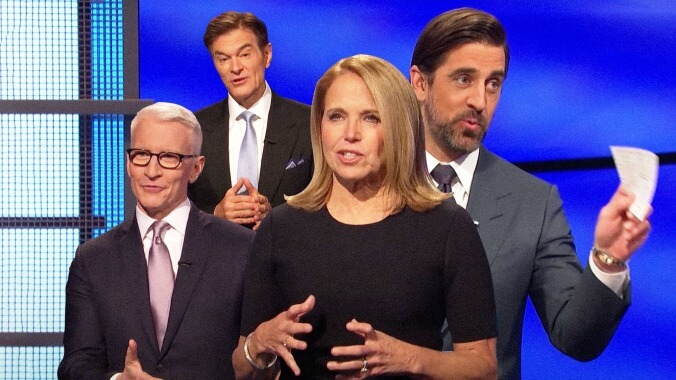There’s no way to know who will make a good Jeopardy! host
Image: Graphic: Natalie Peeples
The debate over who should succeed Alex Trebek as permanent host of Jeopardy! got a contentious boost earlier this April, when LeVar Burton threw his hat into the ring to become Trebek’s replacement (and just as quickly was announced as one of the upcoming guest hosts). Touting the online petition of more than 250,000 signatories that say that the former Reading Rainbow host should take over behind the podium, Burton laid out his case: “Love of the franchise, check. Loves knowledge and curiosity, check. I spent 26 years talking directly to people through the camera lens, check. I bring an audience of Gen X-ers and millennials—checkmate!” And it does make a lot of sense, on paper. Burton’s long-running Reading Rainbow gig—with his warm, charismatic delivery in a smart and insightful tone—is good training, to say nothing of his numerous appearances on other game shows, other PBS programs he’s hosted, and documentaries the actor has not only narrated but also spearheaded. His intellectual bona fides are as legit as they come. (His engaging podcast is simply icing on the cake, résumé-wise.) But if the past weeks of guest Jeopardy! hosts have proven one thing, it’s that there’s no way to know who will actually make a good Jeopardy! host.
At least, not until they’re out on that stage, peppering contestants with questions and keeping the momentum going for 22-plus minutes. As we noted in January after his death, the most impressive aspect of Trebek’s hosting skills was also the one most difficult to call attention to—namely, his low-key unflappability, the way he maintained a brisk and imperturbable demeanor regardless of what was unfolding in the game. Having taken over for the popular original host, Art Fleming, when the quiz show was revived for syndication in 1981, Trebek not only managed to carry on Fleming’s reputation as a fount of knowledge himself, but also brought his distinctive stentorian demeanor to the position. He maintained a superb degree of minimalist engagement during the interview portion, turning even outrageous or absurd comments from contestants into fleeting time-fillers, adding a touch of color but keeping it as brief as possible. He was enigmatic enough to allow viewers to project any number of personae onto him, yet simultaneously came across as forthright and unguarded. He could be acerbic or even curt at times, but never to the detriment of the show. It’s the kind of balancing act that only looks effortless until you try and replicate it. Just ask Will Ferrell.
And as the half-dozen (and counting) guest hosts have thus far demonstrated, it’s anyone’s guess as to who is going to be able to fill those shoes effectively. Some people that seemed like they should be a slam dunk—even in terms of basics, like ease with the camera—have stumbled, while others who appeared to be strange choices turned out to be inspired. It’s why Burton’s curriculum vitae might not end up mattering much, no matter how good a fit it looks on paper. The skills these guest hosts have brought from other TV shows, or even wholly other careers, don’t necessarily translate into making for a good Jeopardy! host. And while it would be easy to say that the je nais se quoi required is akin to “Be as much like Alex Trebek as possible,” that isn’t true. The best replacements thus far have managed to square their personalities with the demands of the job, not subsume them in a clunky attempt to be something they’re not.
The first guest host, and arguably the best thus far, understood this well. Ken Jennings’ six-week run was notable for the smoothness of the transition, but also for just how comfortable Jennings seemed to be in the role. True, there were some first-game jitters, but by the end of the week (Jeopardy! tapes a week’s worth of shows back-to-back in a single afternoon), Jennings looked as though he’d been doing it for years. To be fair, it may be osmosis to a certain degree: Jennings has spent by far the most time on the Jeopardy! stage of any guest host, holding the record for longest-running winning streak in the show’s history, and returning numerous times for championships and special tournaments, ultimately taking a job as a consulting producer with the show in September 2020. It made him uniquely suited to assume hosting duties. “I thought I had studied the man and I understood just what a remarkable job he was doing,” Jennings said of his stint. “And then when I had to do it, I realized he was doing 10 things I wasn’t aware of for every one that I saw.”
